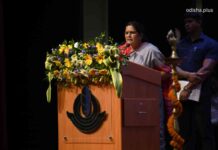By Prof Ujjwal K Chowdhury

Indeed an interesting elections. The Spring campaign of 2019 in India was one sided on the face of it, dominated by PM Modi and BJP’s hype of Article 370 revoking, NRC plan for India and ‘lessons’ to Pakistan. The Opposition made news through its absence in many places, Maharashtra remarkably, except for the veteran Sharad Pawar. In Haryana, it made news through conflicts within itself, especially among former CM Hooda, Congress state president Shelja and outgoing state president Ashok Tanwar.
The results show a different picture. The last figures are yet to come by. But the trends are clear and the lessons are as follows.
First, no hyperbole on nationalism will work when the situation on ground is bad. India has registered the lowest growth rate of 5% in last quarter with the worst employment situation in 45 years and Haryana having the worst employment situation in the nation. Economic slowdown, lowering of consumption, job losses etc are reality on ground, ignoring which is costing BJP substantially. If the governance issue could have potentially damaged the BJP’s prospects in Maharashtra, it’s the government record as well as complacency that seem to have affected the BJP’s tally in Haryana.
Second, it is once again established that national and regional elections are fought on different issues. The unrelated national ‘talking points’ won’t work at the state level. The voters on ground are more bothered about job losses, farm produce procurement prices, roads and infrastructure, law and order, etc. Even unrelated local created issues like Bharat Ratna for Savarkar did not cut ice with the Maharashtra electorate which was more concerned about the farmers’ dire situation (as expressed through their mega rally in Mumbai) and Maratha discontent, apart from joblessness. Voters differentiate between elections and every poll in India cannot be turned into a referendum on Narendra Modi’s government and image. And while Modi will harp on One Nation, One Poll, this election will make the critics stronger in their assertion as voters vote differently in the two polls.
Third, leadership issues within BJP and its allies in Maharashtra and in the Haryana BJP are also again in the forefront. With Haryana CM Khattar being called by Amit Shah and Haryana state BJP president Subhash Barala resigning in the wake of an apparently hung assembly there, there is a leadership challenge there. The Punjabi leadership of BJP in Khattar has not cut ice in any Jat dominated areas of Haryana. Devendra Fadnavis, whose image was so assiduously built by the Mumbai media, could not succeed as per expectation, and will have to be dependent on Shiv Sena.
Sena is expected to call for his head and have its leader Aditya Thackeray for CM or at least deputy CM if their tally is far lower than BJP. Sena has already called for a 50-50 formula for making Maharashtra government, much to the chagrin of state BJP. It is interesting to note that BJP is performing worst in the Vidarbha region within Maharashtra, the region from where the sitting CM Devendra Fadnavis and the ignored central minister Nitin Gadkari hail, and where the party’s ideological fountainhead, RSS, has its headquarters.
Fourth, BJP’s strategy of poaching leaders from other parties also seems to have not gone down well. Leaders like Udayana Raje Bhosale — who quit his Lok Sabha seat of Satatra to join the BJP — were looking set to lose the by-poll by a big margin. Many other turncoats are losing. The NCP cadre and support base seems to be specially angry at the turncoats.
Fifth, this election is also a wake-up call for the Opposition, specially the Congress, which has failed to make an alliance with JJP in Haryana which would have made them sweep the polls there. It has also failed to expand Congress-NCP alliance in Maharashtra adding MNS, Vanchit Aghadi, SP, Shetkari Sanghatana in the UPA alliance, and that would have brought it within the striking range of the saffron alliance of BJP-SS. Alliance is the way to go and opposition cannot waste any more elections in states ahead.
Sixth, the Congress further failed to even campaign effectively. In spite of being the favourites, BJP’s Modi-Shah duo did more than 20 public rallies whereas Congress president Sonia Gandhi did none and Rahul Gandhi addressed 7. The second line of leaders were completely absent in Maharashtra and it was upon Sharad Pawar to do the hard work at 79 years of age and NCP hence is reaping the benefit. Congress-NCP poised to cross 100 seats in Maharashtra: shows a spirited campaign by them could have led to much better results there.

Seventh, regional politics has got a strong fillip indeed. The rise of NCP and Shiv Sena in Maharashtra once again and that of Jannayak Janta Party (JJP) in Haryana shows that. If the national parties cannot work and talk regional, local forces will forge ahead: electorate warns.
Eighth, except the exit poll study of Axis My India, AMI of Pradeep Gupta, for India Today, all exit and opinion polls have gone totally haywire. Neither there is a sweep of the sitting governments in the two states, nor Haryana is having a clear win for the incumbents. The business of poll surveys and the media brouhaha around the same is proving to be of little worth. Either this is methodological error per excellence or as many would say, it is a game of who bids highest.
Ninth, old war-horses prove their mettle. Sharad Pawar is the real winner in Maharashtra and rightly he lamented lack of enthusiasm in the opposition camp. His visual of campaigning in spite of being rain drenched went viral. Hooda is the man of the moment in Haryana and he reinvigorated the party machinery close to the election. If he could take JJP along with him as was proposed and started the campaign six months ago, BJP would have been swept away in Haryana. Combined votes of Congress and JJP is a winner in Haryana today.

Tenth, the possibility of the rise of opposition politics going beyond Modi-Shah domination of Indian politics is being seen from this, which is also buttressed by the win of several Congress and other opposition candidates in by-polls across India. The opposition will do well to make a strong alliance in Jharkhand where the BJP government faces similar anti incumbency like Haryana and in Delhi it is expected to be a direct BJP versus Aam Aadmi Party contest ahead in early 2020.
The author is currently the Pro Vice Chancellor of Kolkata based Adamas University, and was earlier the Media Dean of Symbiosis and Amity Universities. He is a regular columnist and television analyst on political and educational issues.

























